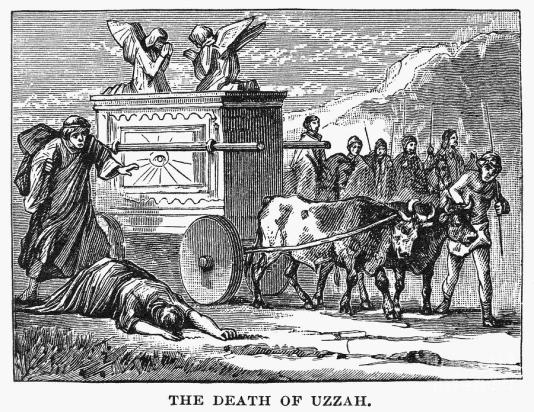The second book of Samuel is mainly about the reign of King David. David is anointed king after Saul’s death. David established his palace in Jerusalem. The entire Chapter 6 of the second book of Samuel shows how much we should reverence the Holiness of God.
2 Samuel 6:2 Then David and all the people who were with him set out for Baala of Judah to bring up from there the Ark of God, which bears the Name of the LORD of hosts enthroned above the cherubim.
(When transporting the Ark of the covenant, they transported it on a cart (instead of Levite priests carrying it with poles) and when it began to tip, the attendant Uzzah touched it to steady it, but was struck dead.

This event caused David to pause his plans for the Ark. However, a family housed the Ark for three months and the family was blessed so after hearing that David sent word to bring the Ark into Jerusalem with a festive procession in which David danced and leapt for joy in front of the Ark.) 2 Samuel 6:17-18 The Ark of the LORD was brought in and set in its place within the tent David had pitched for it. Then David offered holocausts and peace offerings before the LORD. When he finished making these offerings, he blessed the people in the Name of the LORD of hosts.
2 Samuel 7:12-13 (God gave this prophecy to Nathan to tell David about David’s lineage and the words Jesus and Christianity are not in the text, but in the footnotes. )
…And when the time comes and you rest with your ancestors, I will raise up an Heir after you, sprung from your loins, and I will make His kingdom firm. It is He (Jesus) who will build a house for My Name. And I will make His royal throne firm forever (Christianity).

2 Samuel 7:26-29 (David responded to God) ” Your Name will be forever great, when men say, ‘The LORD of hosts is God of Israel,’ and the house of your servant David stands firm before you. It is You, LORD of hosts, God of Israel, who said in a revelation to your servant. ‘I will build a house for you.’ Therefore, your servant now finds the courage to make this prayer to You. And now, LORD God, you are God and Your words are truth; You have made this generous promise to Your servant. Do, then, bless the house of Your servant that it may be before You forever; for You, LORD God, have promised, and by Your blessing the house of Your servant shall be blessed forever.”
Near the end of his life, King David made this beautiful song of thanksgiving to God. 2 Samuel 22:50-51 part of David’s song of Thanksgiving “Therefore will I proclaim You, O LORD, among the nations, and I will sing praise to Your Name, You who gave great victories to Your king and showed kindness to Your anointed, to David and his posterity forever.”













